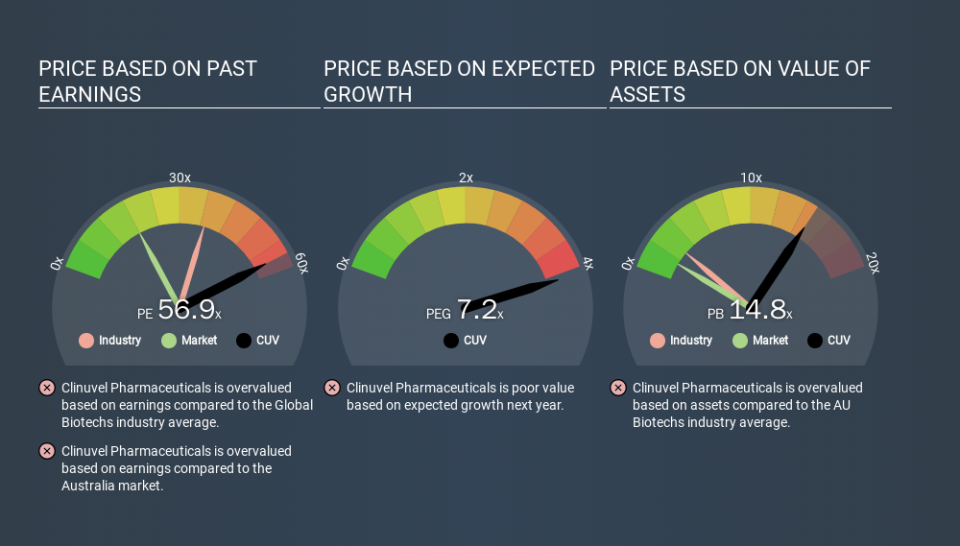What Is Clinuvel Pharmaceuticals's (ASX:CUV) P/E Ratio After Its Share Price Tanked?

Unfortunately for some shareholders, the Clinuvel Pharmaceuticals (ASX:CUV) share price has dived 37% in the last thirty days. Indeed the recent decline has arguably caused some bitterness for shareholders who have held through the 31% drop over twelve months.
Assuming nothing else has changed, a lower share price makes a stock more attractive to potential buyers. In the long term, share prices tend to follow earnings per share, but in the short term prices bounce around in response to short term factors (which are not always obvious). So, on certain occasions, long term focussed investors try to take advantage of pessimistic expectations to buy shares at a better price. Perhaps the simplest way to get a read on investors' expectations of a business is to look at its Price to Earnings Ratio (PE Ratio). A high P/E implies that investors have high expectations of what a company can achieve compared to a company with a low P/E ratio.
View our latest analysis for Clinuvel Pharmaceuticals
How Does Clinuvel Pharmaceuticals's P/E Ratio Compare To Its Peers?
We can tell from its P/E ratio of 56.93 that there is some investor optimism about Clinuvel Pharmaceuticals. As you can see below, Clinuvel Pharmaceuticals has a higher P/E than the average company (37.2) in the biotechs industry.
That means that the market expects Clinuvel Pharmaceuticals will outperform other companies in its industry. The market is optimistic about the future, but that doesn't guarantee future growth. So investors should delve deeper. I like to check if company insiders have been buying or selling.
How Growth Rates Impact P/E Ratios
Generally speaking the rate of earnings growth has a profound impact on a company's P/E multiple. When earnings grow, the 'E' increases, over time. That means unless the share price increases, the P/E will reduce in a few years. And as that P/E ratio drops, the company will look cheap, unless its share price increases.
Clinuvel Pharmaceuticals shrunk earnings per share by 5.9% last year. But EPS is up 76% over the last 3 years.
Don't Forget: The P/E Does Not Account For Debt or Bank Deposits
Don't forget that the P/E ratio considers market capitalization. In other words, it does not consider any debt or cash that the company may have on the balance sheet. The exact same company would hypothetically deserve a higher P/E ratio if it had a strong balance sheet, than if it had a weak one with lots of debt, because a cashed up company can spend on growth.
Spending on growth might be good or bad a few years later, but the point is that the P/E ratio does not account for the option (or lack thereof).
Is Debt Impacting Clinuvel Pharmaceuticals's P/E?
Since Clinuvel Pharmaceuticals holds net cash of AU$57m, it can spend on growth, justifying a higher P/E ratio than otherwise.
The Bottom Line On Clinuvel Pharmaceuticals's P/E Ratio
Clinuvel Pharmaceuticals's P/E is 56.9 which suggests the market is more focussed on the future opportunity rather than the current level of earnings. The recent drop in earnings per share might keep value investors away, but the relatively strong balance sheet will allow the company time to invest in growth. Clearly, the high P/E indicates shareholders think it will! What can be absolutely certain is that the market has become significantly less optimistic about Clinuvel Pharmaceuticals over the last month, with the P/E ratio falling from 90.2 back then to 56.9 today. For those who prefer to invest with the flow of momentum, that might be a bad sign, but for a contrarian, it may signal opportunity.
Investors have an opportunity when market expectations about a stock are wrong. If the reality for a company is better than it expects, you can make money by buying and holding for the long term. So this free report on the analyst consensus forecasts could help you make a master move on this stock.
Of course, you might find a fantastic investment by looking at a few good candidates. So take a peek at this free list of companies with modest (or no) debt, trading on a P/E below 20.
If you spot an error that warrants correction, please contact the editor at editorial-team@simplywallst.com. This article by Simply Wall St is general in nature. It does not constitute a recommendation to buy or sell any stock, and does not take account of your objectives, or your financial situation. Simply Wall St has no position in the stocks mentioned.
We aim to bring you long-term focused research analysis driven by fundamental data. Note that our analysis may not factor in the latest price-sensitive company announcements or qualitative material. Thank you for reading.

 Yahoo News
Yahoo News 

